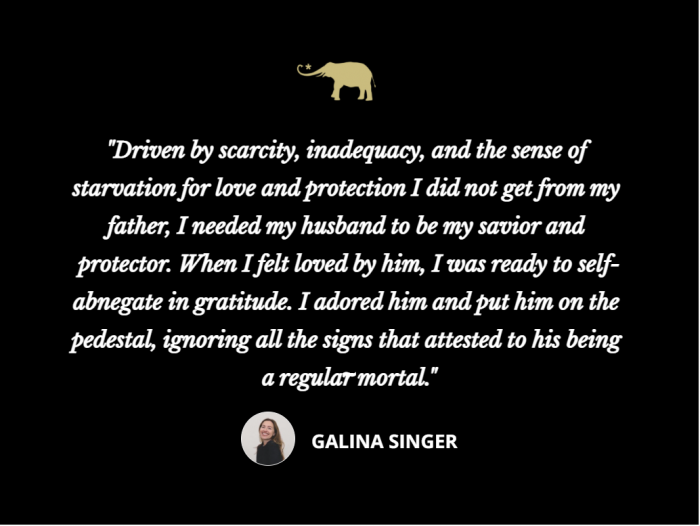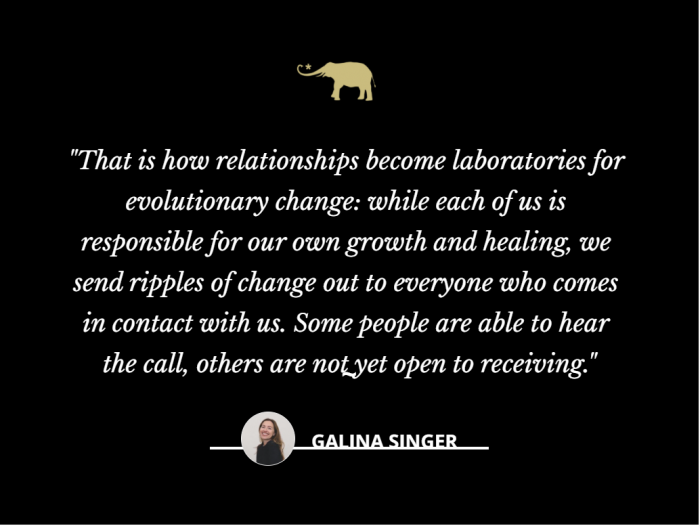View this post on Instagram
Realizing that my husband was a person with fears, triggers, and his own wounded inner child was a serious blow to my capacity to love him.
Driven by scarcity, inadequacy, and the sense of starvation for love and protection I did not get from my father, I needed my husband to be my savior and protector. When I felt loved by him, I was ready to self-abnegate in gratitude. I adored him and put him on the pedestal, ignoring all the signs that attested to his being a regular mortal.
His human inability to save me from the inevitable vicissitudes of life at first invoked paralyzing fear, then anger. I held him responsible for my sense of security, which evaporated when I realized that as a human being, he was facing the same physical limitations as me.
Surrendering my patriarchally conditioned ideal of my husband as my protector provoked within me a process of differentiation. I allowed myself to become separate from him, which was much harder than I expected, as so much of my sense of self was wrapped up in him.
The codependent dynamic by which I lived until then—where I self-sacrificed to meet what I perceived as my husband’s needs in order to motivate him to take care of mine—broke down. Since he was no longer satisfying my needs, I freed myself from the responsibility to meet his needs.
What felt so much like an act of rebellion and liberation was really the other side of woundedness: I went from extreme codependence to extreme independence.
Going toward independence did bring me closer to becoming a sovereign adult.
In my late-40s, I was learning to be the person responsible for my own needs and well-being. I started giving myself permissions that I would not have dared to before when I was single-mindedly focused on pleasing my husband as the single source of my potential fulfillment.
Years later, I am inching closer to the center both in my views about relationships and in my own feelings. Having gone through the spectrum from codependence to independence, I am now exploring interdependence.
From this new perch, I view relationships as here to serve the evolutionary process.
Until recently, committed relationships—particularly marriage—served as instruments of tradition and perpetuated conservative family and societal values.
Today, as we are going through a profound reevaluation of values individually and collectively, the way we do relationships is also undergoing evolutionary pressure. Whereas before we sought to be completed, seeking from the external other what we felt was missing within, we are now invited to bring those qualities out in ourselves.
This evolutionary process—toward healing and wholeness—is each of our individual responsibility.
In my case, the emotional wounds that were reawakened in my relationship actually illuminated where I was giving my power away. Deferring important decisions about my life to my husband, I had given up being in the driver’s seat of my own life. It felt good for a while, until it didn’t.
I was forced by life’s circumstances and the resulting stress in my relationship to step onto the path toward sovereignty and wholeness. The process toward emotional adulthood led me to disrupt the obsolete patterns on which our relationship was built. As I was stretching and growing, I kept changing the music and rhythm of our relating dance, inadvertently inviting my husband to do the same.
That is how relationships become laboratories for evolutionary change: while each of us is responsible for our own growth and healing, we send ripples of change out to everyone who comes in contact with us. Some people are able to hear the call, others are not yet open to receiving.
Relating is a moment by moment exchange of information picked up by our central nervous system.
However, we do not always have access to that stream of information. Disconnected from our bodies, frozen in a post-trauma state, we frequently relate from the mind instead.
Living from the mind means we attach to specific images of what life should look like, holding on to particular identities and prescribed behavioral codes, even if they haven’t served us for generations. Stuck in these stories, we relate by projecting, calculating, manipulating, and expecting as we judge people with whom we are in a relationship on the basis of the story we’ve created about them in our mind. We rarely make space to adjust our story about them to the actual truth of who they are, seeing them only to the extent of our own convenience, baggage, and past experience.
Our childhood wounds—the places where we are traumatized—became scars, and in those places we cannot see or feel, which limits our capacity to receive energetic information moment to moment. When we miss out on important information about ourselves and about the people with whom we are in a relationship, we are unable to build intimacy.
In the absence of intimate relating, our bodies do not feel safety and satiety of deep connection, causing us to seek proof of our importance through exterior symbols and love languages. Modern relationship advice perpetuates codependence and promotes controlling the other by keeping the partners responsible for each other’s needs through superficially imposed codes of behavior that do nothing to address the real issue: the absence of connection.
The safety we seek will not be received through control and forbidding. No scripted words and prescribed behaviors can fill the inner longing, because it comes from our own inner split. No one can give us back the vulnerable and soft inner parts of ourselves that we have locked up and disowned long ago.
Since our romantic relationships rarely deliver the deficit of love we feel from childhood, our attachment wounds get activated. We sacrifice and shapeshift, begging for love, and get angry when the feeling is not forthcoming. When the inner longing is not filled by our partner, we feel triggered and threatened, causing us to withdraw further. We are no longer in the reception of the latest information about our partner and the situation, relating instead with a frozen mental story from the past.
Contrary to popular belief, the language of relationships is not words of affirmations or acts of service, it is resonance: feeling and sensing via streaming of data.
Our perception happens through our central nervous system. When our nervous system is frozen in a state of fear or threat, we are not open to nor able to receive the moment to moment updates of the sensory information. We are not relating.
Human beings are designed to relate through neuroception: “I feel you feeling me,” to use the words of Thomas Hübl.
When our nervous system picks up on that—“me feeling you and being felt by you”—it creates a sense of safety. If I don’t feel you, your nervous system picks up on the absence of connection and, as a result, the body feels stress, without the conscious mind necessarily picking up on that. This is one of the reasons that words of love will not sustainably produce feelings of safety if our nervous system does not pick up the corresponding sense of being felt.
“I feel you feeling me” is the basis of relational safety.
Intimacy is this kind of interpenetration. When my nervous system is calm and regulated, I am open to receiving the information contained in your words. It goes into me and I react to it based on my inner world. Then I say something that goes into you and connects to your inner world. This is relating in real-time.
Trauma triggering freezes that process, interrupting interpenetration. When we are in trauma, our history overtakes the present and we are now reliving our trauma via the implicit memory, no longer relating with the person in front of us. We now relate with some images of our partner we have from the past, which is often mixed with implicit and negative memory. The connection is broken.
In relationships, the greatest gift we can give to each other is our presence.
Becoming present is key to our personal and relational well-being.
To practice presence, we need to cultivate our capacity to be open and receptive to what is happening as it is happening. Training ourselves to be a witness—separating our thoughts from awareness—is an important skill both for our ability to remain present and to attune. Attunement is the ability to know our own inner world, so we can understand the inner life of someone else. With presence and attunement, we come to resonance.
It took me into my late-40s to understand what it actually means to resonate with another, to feel connected, to feel safe. It was a feeling in my body: a kind of sweetness, a sensation of pleasure, and recognition in my solar plexus. I never felt anything like that before. I felt whole, full, safe, and free. The information carried in that embodied knowing changed my life.
I believe this is where the future of relationships lies.
As we heal our trauma and return to inhabiting our bodies again, learn how to separate karmic stories from bodily sensations, decondition our expectations about relationships, and drop our agendas, we become receptive to relating moment by moment, open to feeling others by welcoming them in.
If you would like help coming to embodied safety in your relationships, Contact me for a free introductory conversation.
~


 Share on bsky
Share on bsky






Read 30 comments and reply